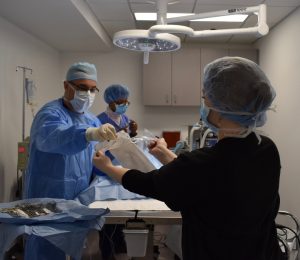Integrative Treatments
Dental Care
Balance Veterinary Center offers dental cleanings with anesthesia. Anesthesia is necessary to achieve the most complete dental cleaning and examination of your pet’s teeth possible.
Our doctors perform full dental cleanings, treatment for advanced stages of periodontal disease, and dental procedures under minimal anesthesia. When it is time for your pet’s anesthetic dental, BVC uses homeopathics and sometimes acupuncture to lower the drug doses, reduce pain, and speed recovery safely. We also provide dental surgery a full dental radiography.
Heartworm Prevention
Heartworm is a potentially deadly parasite that is carried by the mosquito. The adult heartworm is up to 14 inches long, prefers to live in the pulmonary arteries where it causes inflammation and often blood clots, and gives birth to baby worms called microfilariae. This can lead to permanent heart damage.
Once your pet is infected, heartworm treatment can be dangerous and costly. Thus, if your dog spends any time outdoors (even if extremely brief), heartworm testing and prevention should be considered. Prevention is safe and fairly inexpensive. At Veterinary Holistic Care, we test your pet yearly to ensure they don’t have heartworm. We then follow a schedule of prevention with heartworm prevention medication. Heartworm prevention is also able to prevent many gastrointestinal parasites. These parasites can be dangerous to people, especially young children. Because of this we will often recommend that heartworm prevention be given all year-round.
Skin, Dental and General Surgery
 In addition to spaying and neutering, Balance Veterinary Center provides comprehensive general surgery including: removals of benign and malignant tumors, abscesses, and warts skin; biopsies; and tooth extraction.
In addition to spaying and neutering, Balance Veterinary Center provides comprehensive general surgery including: removals of benign and malignant tumors, abscesses, and warts skin; biopsies; and tooth extraction.
Prior to surgery, a pre-anesthesia blood screen will be performed to make sure your pet is healthy as possible for surgery. If the exam and blood work look good, we will proceed with the surgery, but if something is amiss, we will discuss our findings with you. At BVC, we administer the lowest possible dose of the safest possible anesthetics, keep your pet warm and comfortable, and administer a homeopathic or herbal medication after surgery to reduce pain and inflammation. After the surgery, your pet will receive energy healing to ensure maximum possible comfort and to encourage proper healing.
Spay/Neuter
The ovariohysterectomy for females (also called a spay) and the orchiectomy for males (also called a neuter) is the removal of an animal’s reproductive capabilities through surgery. There are advantages and disadvantages to spaying and neutering. Disadvantages can be mostly mitigated through avoidance of early spay/neuter, preoperative laboratory screening, and careful use of anesthesia as well as natural supplements. To help reduce unwanted puppies and kittens, to allow pets to partake in most daycare activities, and to minimize certain health risks and problem behaviors we generally recommend spaying and neutering at a certain age. We usually encourage you to allow your pet to complete its musculoskeletal development, as well as use several months of supplements post-operatively to minimize any negative impact of the body.
Vaccinations and Titers
Virtually every puppy or kitten that enters a veterinary hospital receives an initial series of vaccinations that continue, in the form of “boosters”, for the duration of the pet’s life. Although vaccination is an important weapon in preventing infectious disease, immunization does have limitations and can cause negative reactions. At Balance Veterinary Center we strive to minimize vaccinations while still ensuring protection from serious disease. This is done through blood tests called titers, generally checked every 3 years. When appropriate and in compliance with local laws, we will obtain a blood sample in lieu of giving certain vaccinations. The blood sample is analyzed to see if an adequate antibody level is present to protect from disease. If the antibody level for any particular disease drops too low, we will then administer a booster for just what is needed.

 In addition to spaying and neutering, Balance Veterinary Center provides comprehensive general surgery including: removals of benign and malignant tumors, abscesses, and warts skin; biopsies; and tooth extraction.
In addition to spaying and neutering, Balance Veterinary Center provides comprehensive general surgery including: removals of benign and malignant tumors, abscesses, and warts skin; biopsies; and tooth extraction.